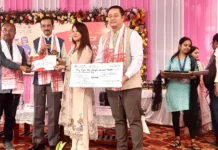[ Samshum Changmi ]
‘Mahila agar ghar chala sakti hein toh desh bhi chala sakti hein’ (If a woman can manage her home, she can manage the nation) is a much used phrase.
However, despite this recognition, India grapples with a stark gender disparity in politics, with only 14.4 percent of the Lok Sabha seats held by women.
India’s democratic fabric, while vibrant, still struggles with gender imbalance in political participation. Despite advancements in various sectors, women remain underrepresented in politics. The concept of women’s reservation in India has emerged as a crucial avenue to address this disparity, aiming to boost female representation in political and public spheres by reserving a specific percentage of seats for women candidates.
This policy has sparked extensive debate and legislative action, acknowledging the significant gap in women’s representation despite their increasing presence in other domains.
Arunachal Pradesh mirrors this national trend of inadequate female representation in politics, despite its rich cultural heritage and diverse demographics. With a mere 8.3 percent of seats in the state assembly held by women, Arunachal grapples with ensuring equitable participation of women in its political landscape.
Despite women constituting a significant portion of the electorate, with 4,49,050 female electors, compared to 4,33,760 male electors, their representation as candidates and elected officials remains alarmingly low in Arunachal. In the 2019 assembly elections, only 11 women contested, with just one candidate for the Lok Sabha elections. Earlier, in the 2014 elections, the number was even lower, with only seven women contesting for the state assembly and none for the Lok Sabha.
The 2019 assembly elections saw three women candidates emerging victorious, all from the ruling Bharatiya Janata Party (BJP), with two successfully retaining their seats. Of the 11 women candidates, the Congress fielded five, the BJP three, the People’s Party of Arunachal (PPA) one, and the JD (U) one.
In the coming simultaneous elections, the political landscape of Arunachal is witnessing the entry of three fresh candidates vying for the ruling party’s ticket. Kohman Lungphi Ngemu, president of the state Bharatiya Janata Mahila Morcha (BJMM) from Miao, brings a wave of new perspectives and challenges as she steps into the fray. Joining her are Nyabi Jini Dirchi, currently holding the position of the Leparada ZPC, and former MLA Karya Bagang from the Chayang Tajo constituency.
These new contenders face formidable opponents, with Ngemu taking on cabinet minister Kamlung Mossang, who faces significant anti-incumbency as he seeks reelection for the fifth term from the Miao assembly constituency. Meanwhile, Dirchi will be engaged in a fierce battle with NPP-turned-BJP MLA Gokar Basar from the Basar assembly constituency. Bagang confronts a triangular challenge against incumbent MLA Hayeng Mangfi and former AAPSU president Hawa Bagang from the Chayang Tajo assembly constituency.
In contrast, Arunachal Pradesh Mahila Congress Committee (APMCC) president Marina Kenglang has thrown her hat into the ring, declaring her candidature from the Changlang North constituency against Legislative Assembly Deputy Speaker Tesam Pongte, adding to the diversity of choices for voters.
On the other hand, sitting MLAs seeking reelection, including Gum Tayeng from Dambuk, Jummum Ete Deori from Lekang, Dasanglu Pul from Hayuliang, Chakat Aboh from Khonsa West, and Tsering Lhamu from Lumla constituencies, aim to continue their service, leveraging their experience and track record to secure victory.
However, it’s undeniable that, out of the five sitting women legislators seeking reelection, many entered politics under tragic circumstances, following the untimely demise of their spouses. Aboh, representing the Khonsa West constituency, won a by-election in October 2019 after her husband was assassinated by insurgent gunmen. Lhamu from the Lumla constituency succeeded her husband and was elected unopposed in February 2023 after his passing. Similarly, Pul from Hayuliang entered the political arena following her husband, former chief minister Kalikho Pul’s, tragic death by suicide in 2016.
In comparison to the assembly elections, Arunachal witnesses less participation of women in the Lok Sabha. For instance, in 2019, Jarjum Ete was the lone woman candidate from the Arunachal West parliamentary seat. Similarly, Toko Sheetal (GSP) could also contend with union minister Kiren Rijiju of the BJP in the Lok Sabha election, highlighting the limited presence of women candidates in such crucial electoral contests.
It’s noteworthy that Omen Moyong Deori was the only woman parliamentarian ever to represent Arunachal in the Rajya Sabha till date, emphasising the rarity of women’s representation at the national level from the state.
Additionally, no major political party, be it the BJP or the INC, has ever projected or encouraged women candidates in the Lok Sabha elections in the state, underscoring the persistent gender disparity in political representation at the highest echelons of governance.
As the BJP boasts of bringing 33 percent women’s reservation into reality after the passing of the Women’s Reservation Bill in 2023, it will be interesting to see how the ruling party encourages women to participate in the political process.
Ensuring greater representation of women in politics not only strengthens democracy but also fosters inclusivity and diversity in decision-making processes, leading to more equitable and sustainable development for all. (The contributor is a freelance journalist, and can be reached at Samsc20@gmail.com)

